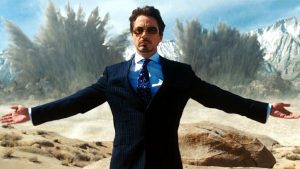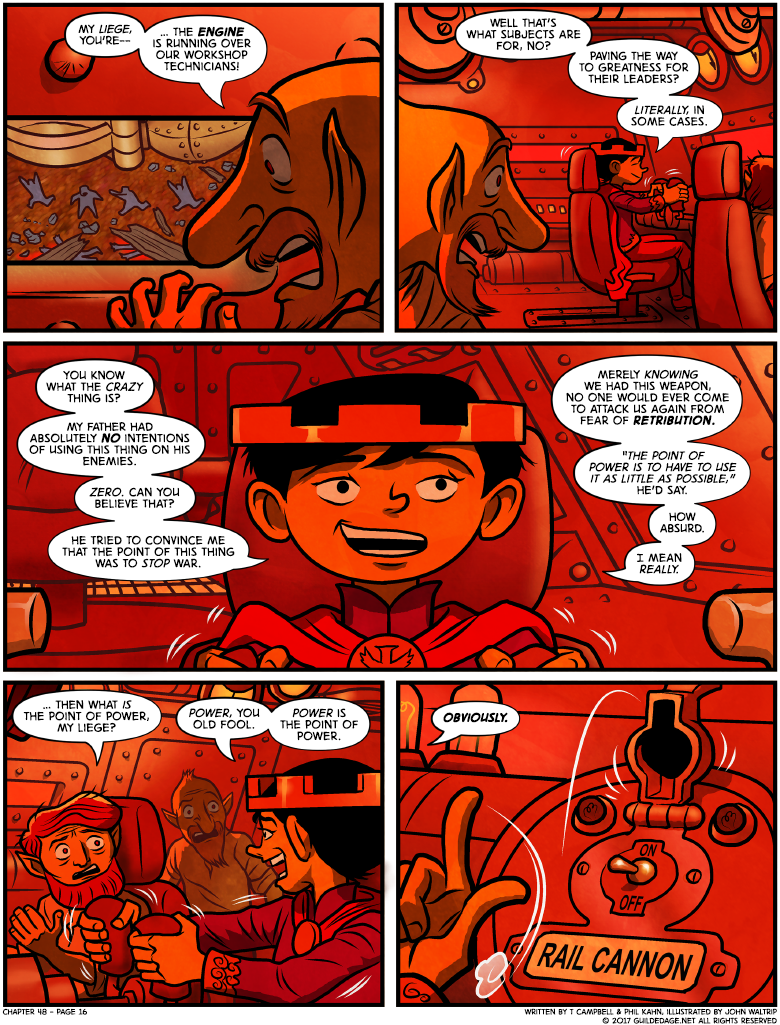Annotated 48-16
 FB: Taro’s reasoning seems a bit circular, but we always did have trouble making sense of the boss’s PowerPoint presentations.
FB: Taro’s reasoning seems a bit circular, but we always did have trouble making sense of the boss’s PowerPoint presentations.
I had to reread Taro’s speech here twice to catch an important clause: Taro says the Engine was never meant for use on Iwatania’s enemies. That’s a little different from never using it at all. Probably, he intended some impressive “test firing” that would put the fear of the gods into those enemies, and that would convince them to sue for peace. “They say that the best weapon is the one you never have to fire. I respectfully disagree. I prefer the weapon you only have to fire once.”
Interesting that this weapon was at least partly Iwatani Sr.’s idea, since it builds very much off Taro’s concepts. The father was not too proud to learn lessons from the son. Although both of them were tragically selective about the things they absorbed from each other.











“Power is the point of power.”
Y’know, Taro and Xykon from Order of The Stick would get along swimmingly on that subject. And a disturbing number of other subjects too…
I don’t think so, actually. Xykon’s power speech (oots page 657 if you need a refresher) was there to show that Xykon is more clever than he let on; Taro’s speech is there to show that Taro is terminally unhinged.
Xykon’s speech is about how the *type* of power doesn’t matter, because “everything is oddly balanced, weird but true”. So he’s the kind of villain that would remark that the power of this battle station is insignificant compared to the power of the Force, because if you can lose your power through a lucky shot at a weak point or a clever act of sabotage, you never really had power in the first place, right? Xykon believes in personal, inalienable power.
It all depends if you count test fire as actual firing…
And also, how much you sign for the Batman method of dealing with active enemies…
And for fairness sake, Taro is in a situation in which he truly needs the might of the weapon to prevail. The fact that he’s using it against his own people too is really the wrong thing here.
“The father was not too proud to learn lessons from the son. Unlike vice versa.”
I don’t think that’s true at all; after all, Taro’s patricide (and the collateral matricide and sororicide) resulted directly from him not being too proud to learn something from his father. It’s just that he’s selective about what he considers worth learning.
Yeah, you’re right that this could be stated better. I’ll pick up the thread with tomorrow’s…
He learned the wrong lesson, and whether that is a failure of the teacher, the student, or both, feels like an interesing conversation to have. If His Grace had not been so damn blind to the little sociopath, maybe we wouldn’t have lost everything.
(Made a revision.)
And to think, they could have just caved Taro’s head in with a wrench right then and there.
At the start of this year, the Russian military was greatly feared. It had the power to win political concessions through the mere threat of its use. Now? Not so much. It turns out that actually using that feared war machine revealed its flaws and now it’s power to influence events has nearly vanished.
Iwatani SR. Had the right idea.
“Power is not a means; it is an end. One does not establish a dictatorship in order to safeguard a revolution; one makes the revolution in order to establish the dictatorship. The object of persecution is persecution. The object of torture is torture. The object of power is power.” ― George Orwell, 1984